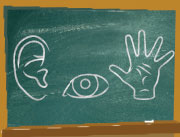5 Facts about Education You Won’t Believe Are False


“A good way to think about homework is the way you think about medications or dietary supplements. If you take too little they’ll have no effect. If you take too much they can kill you. If you take the right amount you’ll get better”
I n every field some basic ideas may eventually be proven wrong. “That’s perfectly all right; they’re the aperture to finding out what’s right” says physicist Carl Sagan. “[Understanding] is a self-correcting process. To be accepted new ideas must survive the most rigorous standards of evidence and scrutiny.”
According to new research by the Organisation for Economic Co-operation and Development trillions of dollars are spent on education policies around the world but just one in ten are actually evaluated. Our intuition about how we learn is often wrong in serious ways. Half-understood science is misleading and we pay too much attention to information that confirms our beliefs.
“The education sector is awash with popular myths and fads that have little if any grounding in evidence ” says University of Melbourne professor of education John Hattie.
Clinging to myths has a price. Time and money are limited and pursuing half-truths keeps us from pursuing useful strategies. For example one in four elementary schools has done away with daily recess to leave more time for standardized testing not realizing that studies show that recess improves test scores.
As students head back to school let’s shine some light on beliefs that don’t bear scrutiny so they can be replaced with true and useful ideas.
Myth #1
Optimal learning takes place via a specific learning style
You’re making sushi for the first time. Will you use a book with pictures? Have a friend talk you through it? Or just make it up as you go? If you prefer a book you’ll call yourself a visual learner. If hearing a description of the process is most helpful to you you’ll call yourself an auditory learner. Or you might decide that you learn best by doing.

Left- or right-brain dominance doesn’t actually affect anything other than which hand we write with
It seems obvious that everyone has a style of learning that suits them best but it’s not true. What’s true is that everyone has a preferred way to learn but those preferences don’t improve learning. If they did then the best way for “visual learners” to learn a list of words would be by seeing it and auditory learners would learn it best by hearing it. But the number of words people learn is exactly the same no matter which way they learn them. This has been tested repeatedly for 40 years and there’s never been any evidence that matching teaching styles to learning styles makes any difference.
We don’t learn by seeing or hearing information but by understanding it. In a study researchers stopped a game of chess halfway through and had both beginner chess players and experts look at the board for five seconds. The beginners remembered the placement of four pieces while the masters remembered on average the placement of 20 pieces.
But the masters weren’t better visual learners. When they had five seconds to look at a board on which pieces were placed randomly they remembered just as few as the beginners. In the half-played game the masters understood the strategies that had brought the pieces to those positions — that’s why they remembered them. They understood the board. When they saw randomly placed pieces they had no connection to the locations and so like the beginners they didn’t remember very many.
The best way to learn doesn’t depend on your style — it depends on what you’re trying to learn. If you want to learn to make a coin disappear and reappear you’re going to have to practice. Reading about how to do it will help and so will watching an expert but the only way you’ll learn to amaze the kids is by practicing it. It doesn’t mean that your favorite way to learn is by doing; it’s just the best way to learn this specific skill.
But believing in the value of learning styles feels so right. Why disabuse people of their comfortable beliefs?
Pegging a child as “an auditory learner” gives him an excuse to avoid other types of learning. But if he doesn’t make a timeline of the sin-punishment-repentance-judge cycle in Sefer Shoftim it won’t sink in. Or since he’s been told he’s good at auditory learning he’ll be overconfident of his knowledge of French verbs not bother to study the verb chart and quit studying before he’s mastered the material.
Tom Bennett considered one of the world’s top teachers by the GEM Global Teacher Prize committee says “I’m not going to let an ‘auditory learner’ listen to a podcast [instead of doing his work]. I need to help him read and write. You can do harm by pandering to preferences rather than pushing students out of their comfort zones.” (Excerpted from Family First Issue 563)
Oops! We could not locate your form.













